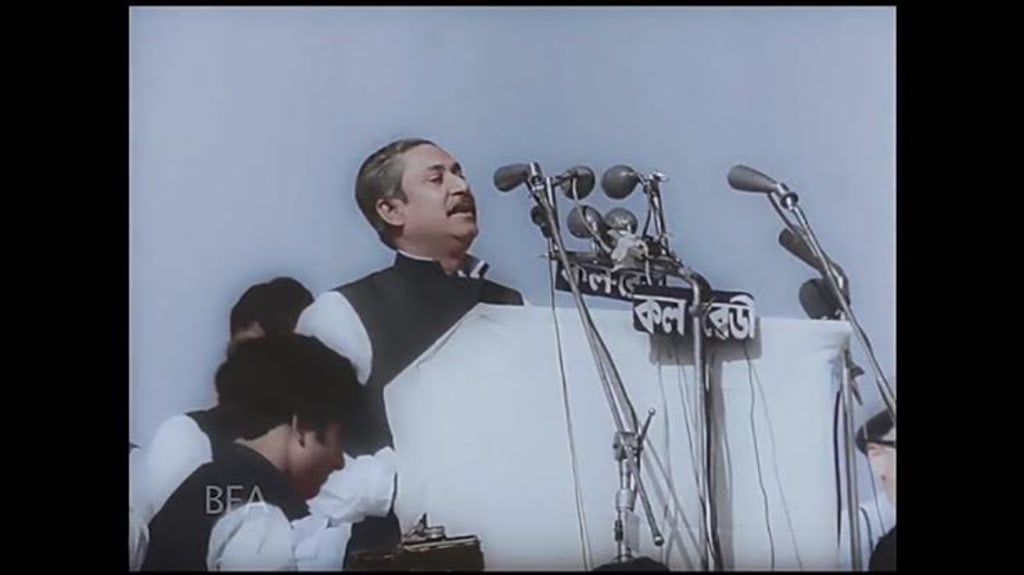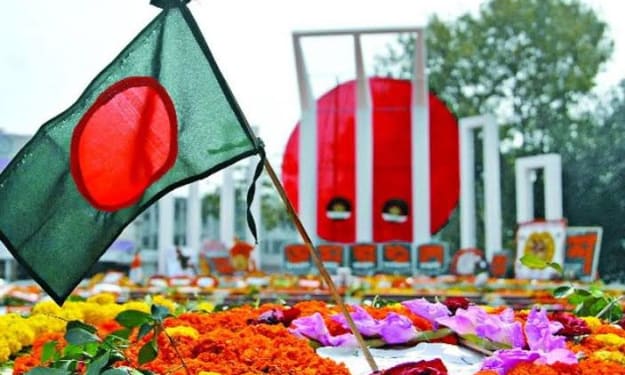Bangabandhu Sheikh Mujibur Rahman. often referred to as the Father of the Nation in Bangladesh
Bangabandhu Sheikh Mujibur Rahman. often referred to as the Father of the Nation in Bangladesh

Bangabandhu Sheikh Mujibur Rahman, often referred to as the Father of the Nation in Bangladesh, played an instrumental role in the country's struggle for independence and its subsequent development. Born on March 17, 1920, in Tungipara, a small village in what was then British India, Bangabandhu's life and legacy are deeply intertwined with the history of Bangladesh.
From a young age, Mujibur Rahman showed leadership qualities and a passion for social justice. He was deeply influenced by the political movements of the time, particularly the Indian independence movement led by Mahatma Gandhi and the struggle for the rights of peasants and workers.
Mujibur Rahman's involvement in politics began during his student years at Islamia College in Calcutta (now Kolkata). He joined the All India Muslim Students Federation and later became involved with the Bengal Muslim League. His early activism focused on advocating for the rights of Muslims in British India and combating social and economic injustices.
After the partition of India in 1947, Mujibur Rahman became increasingly involved in East Pakistan's politics, advocating for greater autonomy and rights for the Bengali population, who felt marginalized by the central government in West Pakistan.
In the 1950s and 1960s, Mujibur Rahman emerged as a prominent leader within the Awami League, a political party dedicated to championing the rights of the Bengali people. He led numerous movements and protests demanding autonomy for East Pakistan and greater recognition of Bengali culture and language.
Mujibur Rahman's political activism often put him at odds with the ruling authorities, and he faced imprisonment several times for his outspoken views and leadership in the struggle for autonomy.
The turning point in Mujibur Rahman's political career came with the 1970 general elections in Pakistan. The Awami League, under his leadership, won a landslide victory in East Pakistan, securing an overwhelming majority of seats in the National Assembly.
The refusal of the ruling authorities in West Pakistan to recognize the Awami League's electoral mandate and their attempts to suppress the Bengali nationalist movement led to widespread unrest and eventually to the Bangladesh Liberation War in 1971.
Mujibur Rahman emerged as the undisputed leader of the Bangladesh independence movement, rallying the people behind the cause of liberation. His historic speech on March 7, 1971, at the Race Course Maidan (now Suhrawardy Udyan) in Dhaka, galvanized the nation and became a rallying cry for independence.
During the nine-month-long war, Mujibur Rahman led from the front, coordinating resistance efforts and diplomatic initiatives while enduring personal hardship and sacrifice. His leadership inspired millions of Bangladeshis to join the struggle for freedom.
On December 16, 1971, Bangladesh achieved victory over Pakistan, and Mujibur Rahman returned to a hero's welcome in Dhaka. He became the first President of Bangladesh and set about rebuilding the war-torn nation and establishing its place on the world stage.
As President, Mujibur Rahman faced enormous challenges, including rebuilding infrastructure, addressing the needs of millions of refugees, and establishing a democratic system of governance. He initiated various social and economic reforms aimed at improving the lives of ordinary Bangladeshis, including land reforms and efforts to alleviate poverty.
Mujibur Rahman's vision for Bangladesh was one of democracy, socialism, and secularism. He believed in the importance of inclusive development and worked tirelessly to promote social justice and equality.
However, his time in office was marked by political instability and economic difficulties. The new nation struggled to overcome the legacy of war and establish stable institutions of governance.
In 1975, Mujibur Rahman's government was overthrown in a military coup, and he, along with most of his family members, was assassinated. The massacre, known as the August 15th incident, shocked the nation and plunged Bangladesh into a period of turmoil and uncertainty.
The assassination of Mujibur Rahman dealt a severe blow to Bangladesh's fledgling democracy and set back the cause of political stability and economic development. The country would spend years grappling with the aftermath of his death and the legacy of authoritarian rule.
Despite his untimely demise, Mujibur Rahman's legacy continues to loom large in Bangladesh. He is revered as the Father of the Nation and is remembered for his unwavering commitment to the cause of freedom and his vision of a democratic and prosperous Bangladesh.
Numerous monuments, museums, and institutions across Bangladesh are dedicated to preserving his memory and honoring his contributions to the nation. His speeches and writings remain influential, serving as a source of inspiration for future generations of Bangladeshis.
Mujibur Rahman's life and legacy serve as a reminder of the enduring power of leadership, courage, and sacrifice in the pursuit of justice and freedom. His ideals continue to shape Bangladesh's national identity and guide its journey towards a brighter future.
About the Creator
Enjoyed the story? Support the Creator.
Subscribe for free to receive all their stories in your feed. You could also pledge your support or give them a one-off tip, letting them know you appreciate their work.






Comments
There are no comments for this story
Be the first to respond and start the conversation.